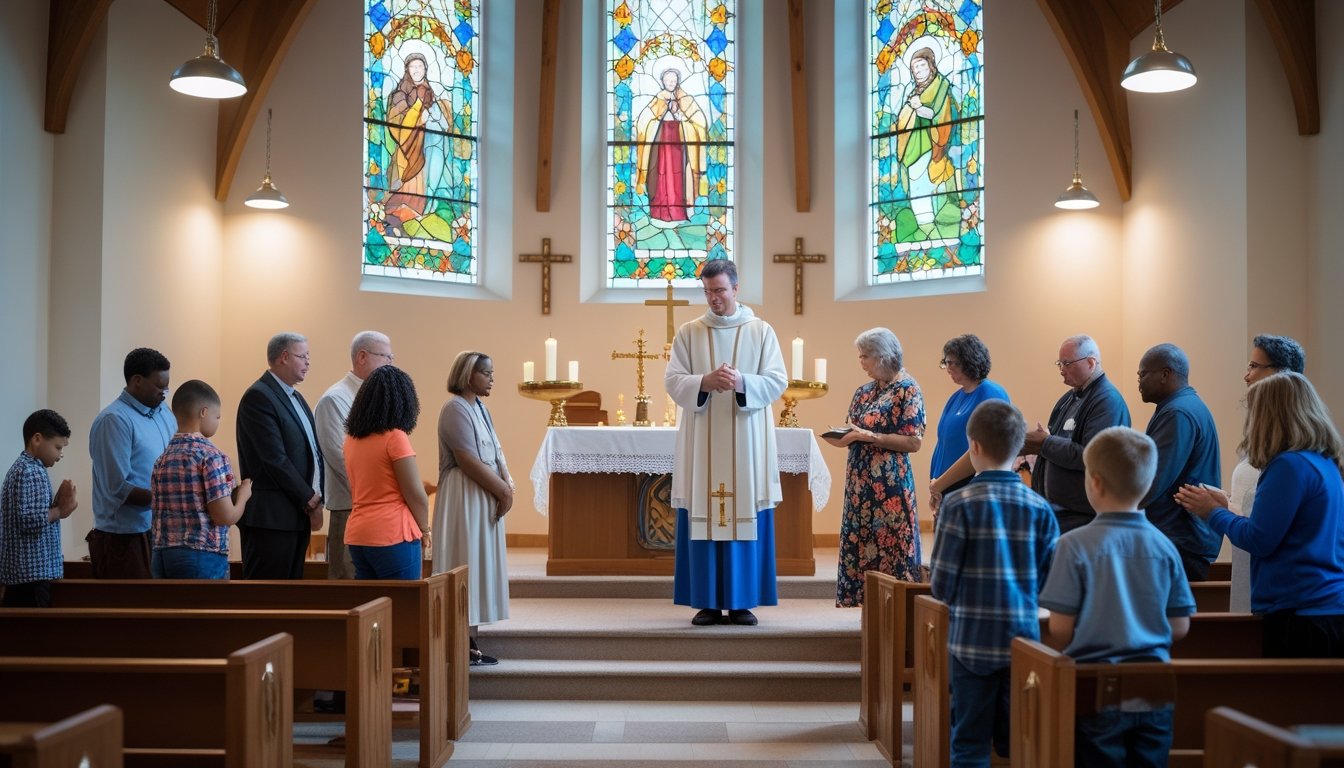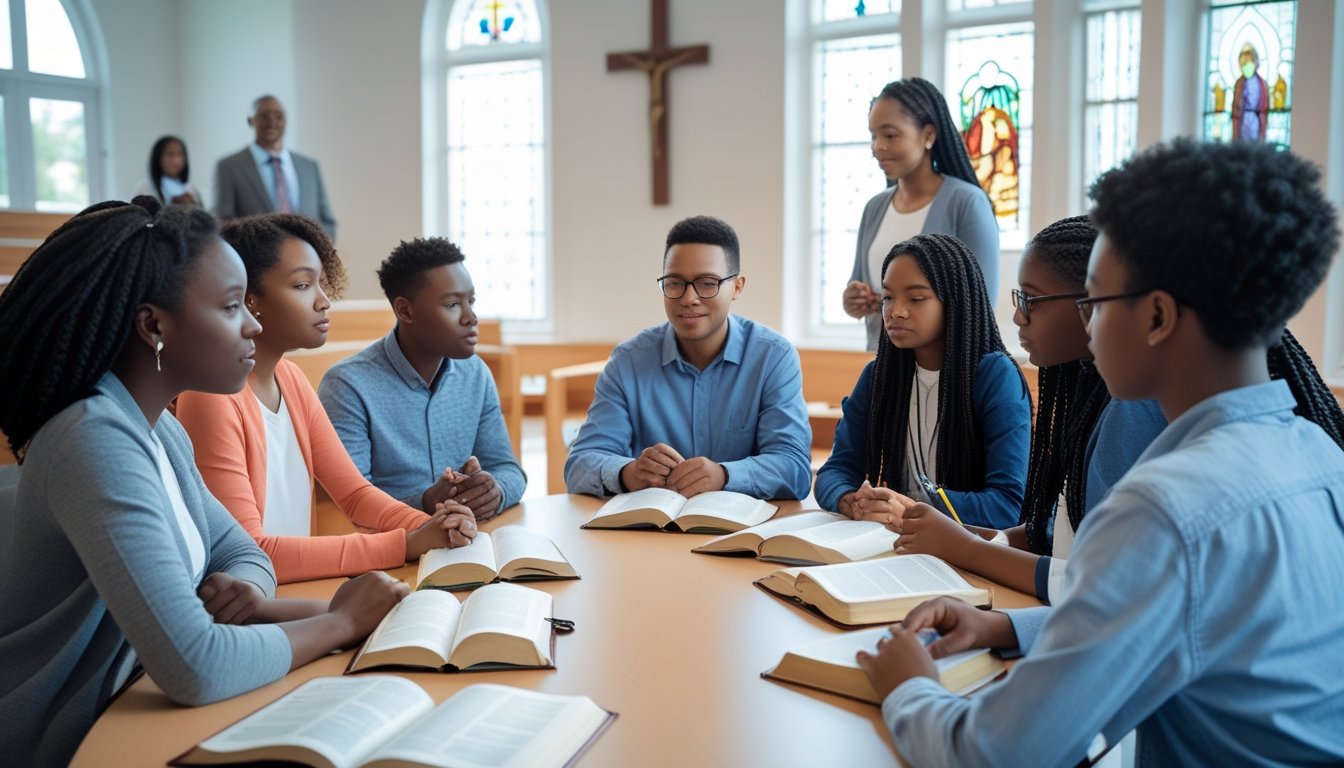Late updated: 29 Sep 2025 09:09
Written by:
Understanding Sacraments in Christian Education: A Clear Guide
Sacraments hold profound significance in Christian education, serving as pivotal elements in spiritual growth and understanding. These sacred rites are outward signs of inward grace, instituted by Christ to fortify believers in their faith journey. From Baptism to the Eucharist, these rites are essential in nurturing a deeper connection with God.

In our exploration of sacraments within Christian education, it’s crucial to recognise their role as tangible expressions of faith. They are not mere rituals but meaningful acts that guide us through various stages of our spiritual lives. By engaging more deeply with these practices, Christians are afforded unique opportunities to connect with the divine.
How do these sacred rites fit into our lives and educational journeys? As we delve deeper, we'll uncover the impact of sacraments in shaping Christian identity and strengthening community bonds. Through a nuanced understanding of sacraments, we can further appreciate their integral role in spiritual development and education.
Key Takeaways
- Sacraments are vital elements in Christian education and spiritual growth.
- They serve as outward signs of inward grace, connecting believers to God.
- Understanding sacraments enriches Christian identity and community.
Defining Sacraments in Christian Education
Sacraments play a pivotal role in Christian education, bridging the physical and spiritual, manifesting invisible grace through tangible signs. By unpacking the origins of the term and exploring theological perspectives, we gain insight into its educational significance.
Origins and Etymology: Sacramentum, Musterion, and Mystery
The term sacrament has evolved from the Latin sacramentum and the Greek musterion. Originally, sacramentum referred to a solemn vow or pledge, often used in a military context. Early Christian thinkers like Tertullian related this term to religious rites, signifying commitment to God.
Musterion, meaning mystery, highlights the concealed divine truths conveyed through sacraments. Cyril of Jerusalem elucidated the notion by depicting sacraments as mysteries revealed through faith. In Christian education, these concepts underscore the depth and richness of sacraments as a means of spiritual engagement.
Visible Signs and Invisible Grace: Theological Perspectives
Sacraments are commonly described as outward signs of inward grace, a concept deeply rooted in theological discussions. Augustine famously emphasised this dual aspect by explaining how tangible elements like water, bread, and wine convey divine grace.
The Catechism of the Catholic Church identifies sacraments as efficacious signs, meaning they actively bestow grace. This relationship between visible and invisible elements is vital for catechesis, as it allows believers to experience divine presence in a palpable way. This intersection of faith and practice forms a core component of religious education.
Sacramental Theology in Christian Formation
Sacramental theology serves as a foundation for Christian formation, shaping our understanding of faith and spirituality. Figures like Peter Lombard contributed significantly by systematising sacramental doctrine. His seminal work, The Sentences, categorised sacraments as essential to church life.
In Anglican traditions, documents like the Book of Common Prayer further articulate sacramental practices, emphasising their role in spiritual nurture. Through preaching and engagement with the Word of God, sacraments are integrated into the personal journey of faith. In Christian education, these theological frameworks inform our methods of teaching and spiritual development.
Sacraments in the Life and Formation of Christians

Sacraments play a crucial role in the spiritual journey and development of Christians, representing profound expressions of faith. They serve as gateways to divine grace, nurturing individuals through significant rites that encompass initiation, healing, and lifelong commitment. By participating in these sacred rites, individuals are woven into the fabric of the Christian community.
Sacraments of Christian Initiation: Baptism, Confirmation, and Eucharist
Baptism is the foundational sacrament marking entry into Christian life, symbolically washing away original sin and welcoming the baptised into the body of Christ. The rite of baptism involves the application of water, signifying purification and renewal. Following baptism, Confirmation strengthens the bond with the Church, conferring the Holy Spirit to empower and guide. Receiving the Eucharist—Holy Communion—is central to sustaining faith. It commemorates Jesus Christ’s death and resurrection through the sacramental rite of anamnesis, where believers partake in the body of Christ. Through these sacraments, the faithful embark on a continuous journey of Christian initiation, united in koinonia.
Sacraments of Healing: Reconciliation and Anointing of the Sick
Reconciliation involves confession, penance, and the forgiveness of sins, restoring the penitent to a state of grace. By confessing sins and receiving absolution, individuals are reconciled with God and the community, reinforcing the path to salvation. Anointing of the Sick, often performed as part of the last rites, offers spiritual and sometimes physical healing. This sacrament involves anointing with holy oil, providing comfort, courage, and strength in illness or impending death. Both sacraments underscore Christ’s healing presence within the faithful, affirming the Church’s role in life’s trials.
Sacraments of Commitment: Marriage and Holy Orders
The Sacrament of Marriage, or Holy Matrimony, forges a sacred bond between partners, reflecting the love of Christ for His Church. It is a covenant marked by mutual giving and openness to life, as spouses are called to foster a Christian family. Holy Orders, including ordination as deacon, priest, or bishop, involves a lifelong commitment to serve God’s people. It entrusts ordained ministers with roles of spiritual leadership, administering sacraments, and guiding the Christian community. Both sacraments are expressions of dedication and service within the wider church.
Role of Faith, Community, and Clergy in the Practice of Sacraments
Faith, community, and clergy are integral to the sacramental experience. Faith acts as a cornerstone, shaping belief and participation in these rites. The Christian community supports members in their spiritual journey, embodying the body of Christ and fostering growth through shared liturgy and communal life. Clergy, including priests and bishops, play a vital role by officiating sacraments, offering guidance, and nurturing faith. Together, these elements create a tapestry that enables believers to live out Christian values, reinforcing bonds through the practice of sacraments.
Frequently Asked Questions

In Christian education, sacraments play a vital role in conveying foundational beliefs and practices. They are deeply intertwined with spiritual growth and community building across various Christian denominations.
What is the significance of the sacraments in Christian beliefs?
Sacraments serve as essential rites in Christian faith, acting as outward signs of inward grace. They are regarded as channels of divine grace, helping believers to connect with the teachings of Christ and the church's traditions. Each sacrament commemorates significant stages of spiritual life, guiding individuals through their faith journey.
How are the sacraments integrated into Christian educational programmes?
Sacraments are integrated into Christian educational programmes by incorporating them into religious studies curriculums and community activities. Through classes, ceremonies, and retreats, students engage with these rituals, learning their meanings and importance. This educational focus helps young Christians articulate and embrace their faith, making sacraments a cornerstone of their spiritual education.
What are the core differences between the sacraments across various Christian denominations?
Christian denominations hold varying views on sacraments, particularly in number and interpretation. For example, Catholicism recognises seven sacraments, while Protestant denominations often observe two: baptism and communion. The ways these sacraments are administered and understood can differ, reflecting theological nuances that contribute to the diversity within Christianity.
In what ways do sacraments contribute to spiritual growth within Christian education?
Sacraments are integral to fostering spiritual growth by encouraging personal reflection, communal worship, and deeper faith commitment. They act as key moments of grace and transformation, nurturing spiritual maturity. Through participation, individuals become more aware of their relationship with God, solidifying their connection to the Christian community.
How is the understanding of sacraments addressed in the curriculum of religious studies?
Religious studies curricula address sacraments by examining their biblical origins, theological significance, and role in church life. Students explore the historical and cultural contexts of these rites, gaining a comprehensive understanding. Discussions, lectures, and practical activities provide varied ways for learners to engage with these core aspects of their faith.
What role do sacraments play in fostering community and identity among Christians?
Sacraments profoundly shape community bonds and individual identity. As communal rites, they bring believers together, reinforcing collective faith and shared values. Celebrating sacraments such as baptism or the Eucharist fosters a sense of belonging and strengthens the relational ties within church communities, anchoring personal and collective Christian identity.
